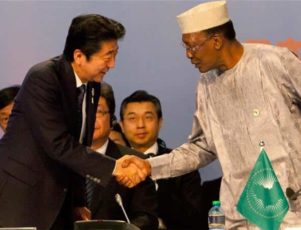Japan recently promised $30 billion in aid to Africa, a pledge that comes in the face of a spate of major investments on the continent by rival China. Japanese Prime Minister Shinzo Abe announced the commitment at the sixth Tokyo International Conference on African Development in Nairobi, Kenya, Aug. 27. The meeting, previously held in Japan, was staged in Africa for the first time this year at the request of the host continent. Abe said the aid will be spread over three years and comes on top of $32 billion Japan pledged to Africa over five years starting in 2013. He said about two-thirds of that money had been put to use. With longstanding trade ties, Japan has a keen interest in Africa’s resources. That interest has intensified since the island nation began to import more oil and natural gas after the 2011 Fukushima disaster shut down nearly all of its nuclear reactors. In recent years, Japan has found a growing rival in China, whose One Belt, One Road trade policy focuses squarely on Africa, Central Asia, and the Middle East.
Funds for infrastructure, education and health care
The latest round of Japanese funding will be used to develop infrastructure and improve health care and education on the continent, Abe said. About $10 billion for infrastructure will be allocated in cooperation with the African Development Bank. It will include roads, ports, airports and power plants that are expected to increase the continent’s electric capacity by 2,200 megawatts.
The money will also be used to train 20,000 mathematics and science teachers throughout the continent, as well as 20,000 experts on how to handle infectious diseases. “Today’s new pledges will enhance and expand on those launched three years ago. The motive is quality and enhancement” Abe said.
Chinese promise $60 billion
Abe’s pledge comes on the heels of a Chinese promise of $60 billion in aid, much of it loans from Chinese banks or export credits rather than direct aid. With its One Belt, One Road policy of establishing trade routes in the West, China has stepped up its investments on the continent in recent years, although the Chinese economic slowdown has reduced trade and posed challenges for African economies that rely heavily on oil and commodity exports.
Still, China has continued to announce large investments on the continent. It plans to build a naval base in Djibouti along with expansions of port facilities and new airports at a cost of more than $12 billion. China will also fund a $4 billion rail link with neighboring Ethiopia. However, with its economic slowdown, China’s investment in Africa decreased by about 40 percent last year.
China dwarfs Japan in trade
Six years ago, China surpassed the United States as Africa’s largest trading partner. The Asian giant has also eclipsed Japan in financial importance to the continent. China’s total trade with Africa of about $179 billion last year dwarfed the approximately $24 billion in trade with Japan.
Japan’s overall direct investment in Africa totaled $1.24 billion in 2015, down from about $1.5 billion a year earlier, according to Japan’s External Trade Organization. China made a single investment of $2 billion in oil-rich Equatorial Guinea in the month of April 2015 alone.
Geopolitics in play
“Japan has a sense of rivalry with China, which has provided large-scale assistance,” Koichi Sakamoto, professor of regional development studies at Toyo University, said. “Since Japan can’t fight China in terms of cash, it needs to stress quality.” Abe said Japanese direct investment totaling $10 billion will begin to flow this year, along with another $20 billion in investment from Japan’s private sector.
In addition to it’s interest in Africa’s resources, Japan has strong political motives on both regional and global fronts for strengthening ties with Africa, according to Seijiro Takeshita, an economist and professor at the University of Shizuoka. For one thing, Japan is seeking support to become a permanent member of the United Nations Security Council. Japan and other nations in the region also see China as an aggressor. “This is basically (seeking) to ward off continuous aggression the neighboring nations feel from China,” Takeshita said.
Read more



